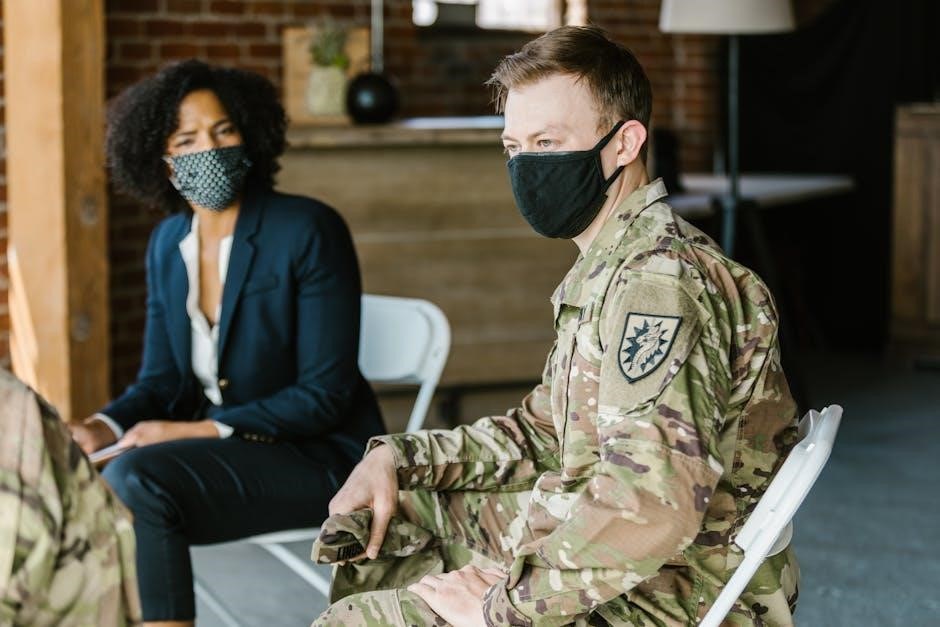Understanding PTSD Coping Skills
Developing effective PTSD coping skills involves learning techniques to manage symptoms and improve daily functioning. Strategies like grounding, deep breathing, and cognitive restructuring can help individuals regain control over their emotions and thoughts, fostering resilience and long-term recovery. These skills, often outlined in PTSD coping skills PDF guides, provide practical tools for navigating trauma and rebuilding a fulfilling life.
Post-traumatic stress disorder (PTSD) is a mental health condition triggered by traumatic events, leading to severe emotional and psychological distress. It significantly impacts daily life, relationships, and overall well-being. Symptoms such as flashbacks, nightmares, and hyperarousal can interfere with functioning, making coping skills essential for recovery. Understanding PTSD’s effects is the first step toward managing symptoms and regaining control. Effective coping strategies, often detailed in PTSD coping skills PDF guides, empower individuals to navigate their trauma and rebuild a fulfilling life.
Overview of Effective Coping Strategies
Effective PTSD coping strategies focus on managing symptoms and enhancing resilience. Techniques like grounding, deep breathing, and cognitive restructuring help individuals regain control over their emotions and thoughts. These methods, often detailed in PTSD coping skills PDF guides, emphasize practical tools for daily life. By practicing these strategies, individuals can reduce distress and improve their ability to function. Over time, consistent use of these skills fosters long-term recovery and personal growth, helping individuals move beyond trauma and rebuild fulfilling lives.
Types of PTSD Coping Skills
PTSD coping skills include emotional regulation techniques and practical daily management strategies. These methods help individuals manage symptoms and improve their ability to function in daily life effectively.
Emotional Regulation Techniques
Emotional regulation techniques are essential for managing PTSD symptoms. Techniques like the 4-7-8 breathing method and grounding exercises help calm the mind and body. These strategies, often detailed in PTSD coping skills PDF guides, teach individuals to recognize and control emotional responses, reducing overwhelm. By practicing these methods regularly, individuals can better navigate triggers and maintain emotional balance, fostering a sense of stability and control over their mental health.
Practical Daily Management Strategies
Practical daily management strategies for PTSD focus on creating routines that promote stability and reduce stress. Activities like journaling, exercise, and mindfulness can help individuals stay grounded. PDF guides often recommend tracking triggers and responses to identify patterns. Setting realistic goals and engaging in creative outlets, such as art or music, can also provide emotional relief. Building a structured daily schedule helps maintain control and normalcy, empowering individuals to manage symptoms effectively and foster long-term resilience.

Grounding Techniques for PTSD
Grounding techniques help individuals focus on the present, reducing dissociation and flashbacks. Common methods include sensory exercises and deep breathing, often detailed in PTSD coping skills PDF guides.
The 5-4-3-2-1 Grounding Method
The 5-4-3-2-1 grounding technique is a powerful tool to anchor oneself in the present moment. Start by identifying 5 things you can see around you, 4 things you can touch, 3 things you can hear, 2 things you can smell, and 1 thing you can taste. This method helps redirect focus from distressing thoughts to tangible sensations, providing immediate relief and reducing feelings of dissociation. Detailed in many PTSD coping skills PDF guides, this technique is simple yet effective for managing anxiety and flashbacks.
Deep Breathing Exercises
Deep breathing exercises are a cornerstone of PTSD coping strategies, offering a simple yet potent way to calm the mind and body. Techniques like the 4-7-8 method—inhale for 4 seconds, hold for 7, exhale for 8—help reduce anxiety and promote relaxation. Regular practice can lower stress hormones, slow heart rates, and improve focus. These exercises, often detailed in PTSD coping skills PDF guides, empower individuals to manage triggers and regain emotional balance, proving effective in both immediate crisis situations and long-term recovery journeys.

Cognitive Behavioral Therapy (CBT) for PTSD
CBT is a proven approach for managing PTSD, focusing on identifying and challenging negative thought patterns. It helps individuals reframe traumatic experiences, reducing symptoms and fostering resilience through structured techniques.
Challenging Negative Thoughts
Challenging negative thoughts is a core component of CBT for PTSD. This technique helps individuals identify and reframe unhelpful patterns of thinking that contribute to distress. By learning to question the accuracy of negative beliefs and replacing them with more balanced perspectives, individuals can reduce anxiety and improve emotional regulation. Practical exercises, such as thought-stopping and cognitive restructuring, are often used to address these patterns effectively. Over time, this process fosters resilience and helps individuals manage triggers more constructively, aligning with the strategies outlined in PTSD coping skills PDF guides.
Cognitive Restructuring Techniques
Cognitive restructuring techniques are powerful tools for managing PTSD symptoms. These methods involve identifying and modifying negative thought patterns that exacerbate distress. By examining evidence for and against unhelpful beliefs, individuals can develop more balanced and constructive ways of thinking. Techniques such as thought challenging and reframing are commonly used to reduce emotional intensity and improve coping abilities. These strategies are frequently detailed in PTSD coping skills PDF guides, offering structured exercises to practice and integrate these techniques into daily life, promoting long-term recovery and emotional well-being.

Physical and Emotional Self-Care
Physical and emotional self-care are crucial for managing PTSD symptoms. Regular exercise, mindfulness practices, and relaxation techniques help reduce stress and improve overall well-being. These strategies, often detailed in PTSD coping skills PDF guides, emphasize the importance of nurturing both body and mind to foster resilience and emotional stability, enabling individuals to better navigate challenging situations and promote long-term recovery.
Exercise and Physical Activity
Exercise and physical activity are powerful tools for managing PTSD symptoms. Activities like walking, running, or yoga can reduce stress, improve mood, and enhance overall well-being. Regular physical activity helps release endorphins, which act as natural painkillers and mood elevators. For individuals with PTSD, exercise can provide a sense of control and empowerment, distracting from traumatic thoughts while improving sleep quality. Many PTSD coping skills PDF guides recommend incorporating exercise into daily routines, emphasizing its role in fostering resilience and long-term recovery. Consistency is key to experiencing these benefits.
Mindfulness and Relaxation Practices
Mindfulness and relaxation practices are essential for managing PTSD symptoms. Techniques like deep breathing, meditation, and grounding help individuals stay present, reducing anxiety and emotional overwhelm. These practices foster emotional regulation and reduce the intensity of flashbacks or intrusive thoughts. Regular mindfulness exercises can improve sleep quality and overall well-being. Many PTSD coping skills PDF guides emphasize these methods, offering step-by-step instructions to incorporate them into daily life. Consistency in practice is key to experiencing long-term benefits and emotional stability.
Building a Support System
A strong support system is crucial for managing PTSD. Therapy, support groups, and trusted individuals provide emotional backing and practical assistance, helping individuals feel less isolated and more empowered.
The Role of Therapy and Professional Help
Therapy and professional help are cornerstone strategies for managing PTSD. Cognitive Behavioral Therapy (CBT) and trauma-focused approaches enable individuals to process experiences and develop coping techniques. Trained professionals provide a safe space for exploration and healing, offering personalized strategies and evidence-based methods. Regular sessions help individuals understand symptoms, reframe negative thoughts, and build resilience. Professional guidance also includes creating tailored plans and incorporating techniques from PTSD coping skills PDF workbooks. This support fosters long-term emotional growth and empowers individuals to navigate their recovery journey effectively.
Importance of Social Connections
Social connections play a vital role in managing PTSD, as they provide emotional support and reduce feelings of isolation. Engaging with others helps individuals process trauma and rebuild trust. Group therapy and support groups offer a sense of community, allowing individuals to share experiences and learn from others. Additionally, informal support from family and friends can provide practical help and encouragement. Strengthening social ties fosters resilience and improves overall well-being, making it easier to cope with PTSD symptoms and integrate PTSD coping skills PDF strategies into daily life.

Self-Help Resources and Workbooks
Accessing PTSD coping skills PDF guides provides practical tools for managing symptoms. Workbooks like the “HEAL Coping w/Trauma Handout” and Skills for Psychological Recovery Field Operations Guide offer structured exercises to help individuals process trauma and develop resilience through actionable strategies and techniques.
Recommended PDF Guides for PTSD Coping
Several PTSD coping skills PDF guides are highly recommended for managing symptoms effectively. The “HEAL Coping w/Trauma Handout” by Boston College and the “Skills for Psychological Recovery Field Operations Guide” provide structured exercises and strategies to process trauma. These resources offer practical tools for grounding techniques, cognitive restructuring, and emotional regulation. Designed for self-help and professional use, they empower individuals to develop resilience and improve their quality of life through actionable steps and personalized worksheets.
Using Worksheets for Skill Development
Worksheets are powerful tools for developing PTSD coping skills, offering structured exercises to track progress and practice new techniques. They help individuals identify triggers, process emotions, and build resilience. Many PTSD coping skills PDF guides include worksheets for grounding, emotional regulation, and cognitive restructuring. These resources are ideal for both therapy and self-help, providing a clear framework to apply skills in daily life and foster long-term growth.
Mastering PTSD coping skills is a journey toward healing and growth. With consistent practice and the right tools, individuals can manage symptoms and rebuild fulfilling lives. PTSD coping skills PDF guides provide valuable resources for long-term recovery and resilience.
Long-Term Recovery and Growth
Effective PTSD coping skills lay the foundation for long-term recovery and personal growth. By consistently practicing techniques like grounding, deep breathing, and cognitive restructuring, individuals can reduce symptoms and rebuild their lives. PTSD coping skills PDF guides offer structured exercises and strategies to help individuals progress beyond trauma, fostering resilience and emotional well-being. Over time, these tools empower individuals to regain control, pursue meaningful relationships, and achieve a fulfilling life. Sustained effort and self-compassion are key to lasting growth and healing.
Final Thoughts on Effective Coping
Mastering PTSD coping skills is a journey that requires patience, consistency, and self-compassion. By integrating techniques like grounding, deep breathing, and cognitive restructuring into daily life, individuals can manage symptoms and enhance their well-being. PTSD coping skills PDF guides provide accessible resources for ongoing learning and practice. Remember, recovery is a process, and every step forward is a victory. With the right tools and support, individuals can transform their challenges into opportunities for growth and emerge stronger and more resilient.
